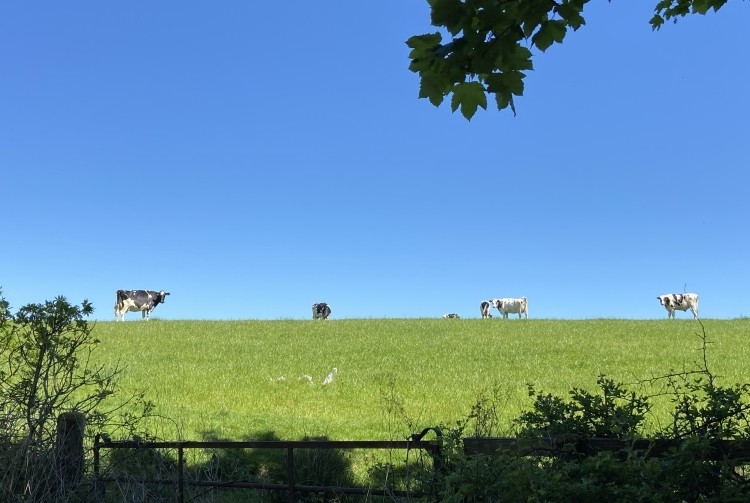$5tn investor group and former UN Secretary-General urge G20 leaders to set clear agriculture emission targets
Are cows the new coal?

A global investor coalition and former UN Secretary-General Ban Ki-moon are calling on all G20 nations to disclose specific targets to reduce agricultural emissions within their nationally determined contributions (NDCs) in the lead up to COP26 climate talks in November.
In the ‘Where’s the Beef’ statement, an initial $5tn group of investors coordinated by the FAIRR Initiative is urging G20 governments to be more transparent about how much of the emissions reductions planned in their NDCs will come from the agriculture sector. Ban Ki-moon has also signed the statement.
Agriculture currently accounts for a third of all global emissions. However, none of the G20’s currently released NDCs include clear national targets for emissions reductions in the agriculture sector, the group said. This is not the case with other high-emitting sectors: 50% of updated NDCs of the G20 have targets for the energy sector and 20% for transport.
The group said reaching net-zero emissions will be impossible without a radical overhaul of the agricultural sector, so investors are asking for clarity from world leaders about what role this often-overlooked sector will play in their decarbonization plans if the trillions required for the low-carbon transition are to be successfully unlocked.
Jeremy Coller, chair of FAIRR and chief investment officer of Coller Capital, said, “Cows are the new coal. The emissions from agriculture and related land use are on a level with the greenhouse gases emitted by the EU, US and Japan combined. If the COP26 process can transparently set out each country’s plans to address agriculture's climate footprint, it would boost the confidence of investors to mobilize capital towards more sustainable food and farming.
"If investors don’t know where they are going, anywhere will do. Reducing emissions without a roadmap for how to get there is not only ineffective but highly damaging for investors and companies keen to ensure a fair and equitable transition to a net-zero economy.”
Coller said governments have the opportunity to show leadership and be transparent about how much of their climate pledges will be ring fenced as coming from agriculture.
“Capital markets need that data. That’s why I’m joining today with investors managing $5tn in assets to warn that ‘cows are the new coal’ and ask G20 leaders: ‘Where’s the Beef?'.”
Ban Ki-moon, eighth Secretary-General of the UN, and one of the architects of the 2015 Paris Agreement, said, “Governments are making progress with ambitious pledges to reduce emissions, but if we are to meet the goals of the Paris Agreement, countries must also say how they will tackle the high level of emissions from the agricultural sector as part of their national climate commitments.
“I support investors and the ‘Where’s the Beef?’ campaign as governments submit updated climate plans ahead of COP26. Transparent emission reduction targets will help investors and wider stakeholders measure progress towards net zero and chart the transition to more sustainable agriculture. Governments must work with farmers to build a sustainable and climate-smart agricultural sector that safeguards the livelihoods and communities that rely on farming around the world.”
The campaign is entitled ‘Where’s the Beef?’ as the agricultural sector includes beef production, the highest-emitting element of animal agriculture, which alone is responsible for 15% of all greenhouse gas emissions.
The coalition also said a lack of clear national targets is disincentivizing climate action from agriculture firms. It said as the global regulatory landscape moves to accelerate decarbonization, clear national targets for agriculture will lead to a better managed, more timely and better managed transition for all.
As part of their NDCs, the EU has pledged to cut carbon emissions at least 55% by 2030 compared with 1990 levels, while the UK has committed to reduce emissions by 78% by 2035 compared to 1990 levels.
The US has pledged to halve emissions by 2030, Japan plans to cut its emissions by 46% from 2013 levels by 2030, and Canada will cut emissions by 40-45% in the next decade.
However, the group argued, none of these NDCs specify targets for emissions reductions in the agriculture sector. Investors argue this is urgent, as one in three of 60 of the world’s largest animal protein producers’ emissions reported an increase in emissions in 2019.
The coalition said it also encourages countries to go further to establish frameworks for a transition to more healthy and sustainable diets that boost human health while remaining within planetary boundaries, for instance, by incorporating more sustainable protein options: 340m tonnes of meat is currently produced globally every year, more than three times that of 50 years ago. The IPCC has highlighted the mitigation potential of plant-based diets in climate change, so the coalition said it invites G20 governments to outline how populations can incorporate more sustainable protein sources into their diets to tackle food insecurity, build more resilient supply chains, protect biodiversity and reduce emissions.









